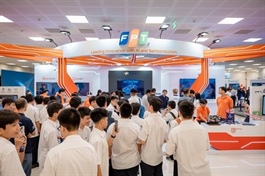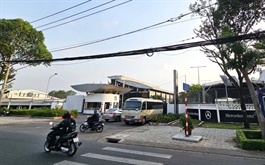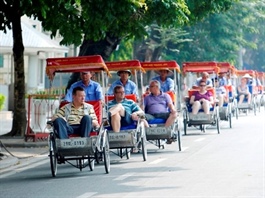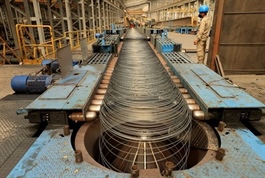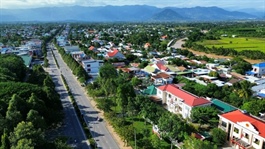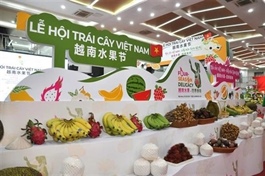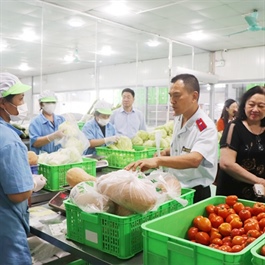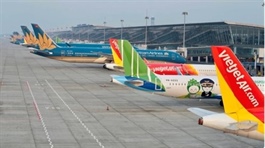Boosting Việt Nam-China Trade and Industrial Cooperation
Boosting Việt Nam-China Trade and Industrial Cooperation
Minister of Industry and Trade Nguyễn Hồng Diên had a working session with China's Minister of Industry and Information Technology Jin Zhuanglong in Beijing on September 30 as part of the Vietnamese official’s trip to China for the 13th meeting of the Việt Nam-China Committee for Economic and Trade Cooperation.
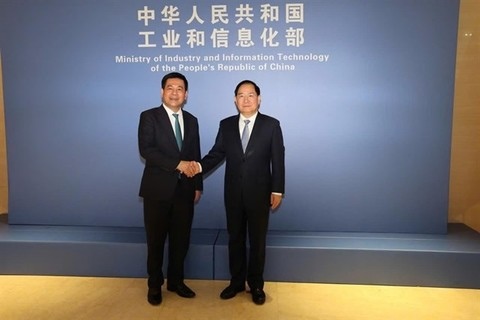
Minister of Industry and Trade Nguyễn Hồng Diên (left) and Minister of Industry and Technology of China Jin Zhuanglong. — Photo Bnews.vn |
Diên said that the Vietnamese delegation's trip to China aims to implement the common perceptions reached by senior leaders of Việt Nam and China during Party General Secretary and State President Tô Lâm’s August visit to China, and to continue promoting economic, trade and industrial cooperation between the two countries.
He thanked Jin and Chinese colleagues for coordinating with the Vietnamese side to sign a memorandum of understanding on industrial cooperation between the Ministry of Industry and Trade of Vietnam and the Ministry of Industry and Information Technology of China. The signing of this document is significant, as it serves as a basis for the two sides to promote cooperation in their areas of strength for industrial development, and at the same time to foster the cooperative relationship between the two ministries.
Diên said that industrialisation and modernisation is a thorough and consistent policy of the Party and State of Việt Nam. After nearly 40 years of Đổi Mới (Renewal), especially in the 10-year period from 2011 to 2020, the industrialisation and modernisation process has helped boost Vietnam's economic growth to an average of 6.17 per cent per a year, making Việt Nam a middle-income developing country.
He noted that Việt Nam's industrial sector has been restructured, with a reduction in the proportion of the mining industry and an increase in the share of the processing and manufacturing industries. A number of large-scale industries have been established with the capacity to compete and secure a solid position in the international market. Furthermore, the scale of industrial production has been continuously expanded.
The infrastructure of industrial parks and industrial clusters has developed, contributing to attracting domestic and foreign investors, especially in industries and fields with potential, advantages, and high added value, Diên said.
Việt Nam and China are neighbouring countries, and Việt Nam has participated in a series of free trade agreements with major partners, such as the Việt Nam-EU Free Trade Agreement (EVFTA), the Comprehensive and Progressive Agreement for Trans-Pacific Partnership (CPTPP), and the Regional Economic Partnership Agreement (RCEP). These agreements have helped bring the production and supply chains between Việt Nam and China closer, creating more cooperation opportunities for businesses operating in the industrial sectors of the two countries.
To promote cooperation in industry between Việt Nam and China, Diên suggested that both sides should enhance collaboration in the automotive industry. This includes fostering partnerships with large corporations that have invested in Việt Nam and working with domestic companies in vehicle production and assembly to align with the government's direction and the Vietnamese market.
Regarding cooperation in the consumer goods industry, he proposed that China coordinate to organise workshops to share experience that would help Việt Nam in upgrading production lines and minimising raw material waste in food processing. He noted that China's food sector is applying advanced technologies such as 5G and artificial intelligence to improve operations in food processing.
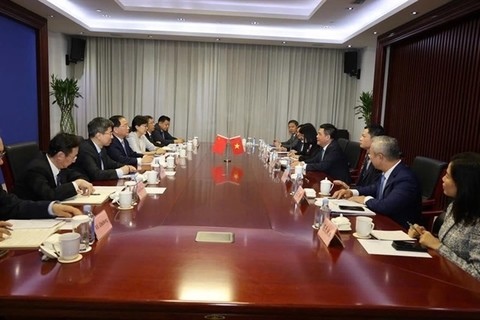
At the meeting. — Photo Bnews.vn |
Diên also called for increased collaboration on scientific and technical research, as well as technology transfer in the exploration, extraction, processing, and utilisation of minerals. This would help improve efficiency, reduce resource loss, increase labour productivity, and ensure environmentally friendly products in compliance with Vietnamese laws and standards.
Additionally, both sides need to strengthen exchanges and share experiences and policies at both central and local levels regarding supply chain development, as well as promote linkage between Chinese FDI enterprises and domestic Vietnamese companies. He also requested that China enhance support for Vietnamese businesses to deeply engage in supplying products and services to foreign investors, share information, and organise training sessions to assist Vietnamese officials and experts in managing and developing industries.
The Vietnamese government has attractive policies to draw foreign businesses to invest in foundational industries, supporting industries, mechanical technology, manufacturing, and new energy sectors, Diên said. He expressed his wish for both sides to expedite the implementation of three railway routes connecting Vietnam and China, namely Lào Cai-Hà Nội-Hải Phòng, Lạng Sơn-Hà Nội, and Móng Cái-Hạ Long-Hải Phòng lines.
For his part, the Chinese Minister of Industry and Information spoke highly of the memorandum of cooperation recently signed between the two ministries in August this year, suggesting that both sides establish regular cooperation and exchange mechanisms to further enhance economic and industrial collaboration. Highlighting areas with significant potential for cooperation, Jin said that businesses from both countries could boost collaboration in sectors of mutual interest, such as raw materials, the automotive industry, electrical engineering, and the development of industrial zones.
He mentioned that major automobile manufacturers in China plan to expand their investments and operations in Việt Nam, and his ministry is committed to supporting Chinese companies in this endeavour.
Regarding the proposal for cooperation in the mineral sector, Jin affirmed that this area holds significant potential for both sides, and China is ready to collaborate with Việt Nam to support businesses in researching and implementing joint projects in mineral exploration, exploitation and processing while adhering to the legal policies of both nations.
Affirming that there remains ample room for Việt Nam and China to cooperate in the industrial sector, he suggested that both sides promote the development of supply chains, enhance collaboration in electrical engineering, consumer goods, supporting industries, and foster the development of aerospace technology.







